| Listing 1 - 10 of 16 | << page >> |
Sort by
|
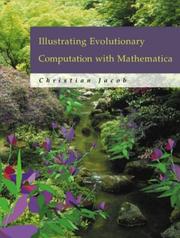
ISBN: 1558606378 9786611754952 0080508456 1281754951 0585457077 9780585457079 9781558606371 9780080508450 Year: 2001 Publisher: San Francisco : Morgan Kaufmann Pub.,
Abstract | Keywords | Export | Availability | Bookmark
 Loading...
Loading...Choose an application
- Reference Manager
- EndNote
- RefWorks (Direct export to RefWorks)
An essential capacity of intelligence is the ability to learn. An artificially intelligent system that could learn would not have to be programmed for every eventuality; it could adapt to its changing environment and conditions just as biological systems do. Illustrating Evolutionary Computation with Mathematica introduces evolutionary computation to the technically savvy reader who wishes to explore this fascinating and increasingly important field. Unique among books on evolutionary computation, the book also explores the application of evolution to developmental processes in n
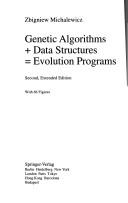
ISBN: 3540580905 9783540580904 Year: 1994 Publisher: Berlin Springer
Abstract | Keywords | Export | Availability | Bookmark
 Loading...
Loading...Choose an application
- Reference Manager
- EndNote
- RefWorks (Direct export to RefWorks)
Evolutionary programming (Computer science) --- Genetic Algorithms --- Data structures (Computer science) --- Computer algorithms --- Computer programs --- Information structures (Computer science) --- Structures, Data (Computer science) --- Structures, Information (Computer science) --- Electronic data processing --- File organization (Computer science) --- Abstract data types (Computer science) --- Computer program files --- Files, Computer program --- Program files, Computer --- Programs, Computer --- Computer files --- Computer software --- Algorithms --- Genetic algorithms. --- Data structures (Computer science). --- Evolutionary programming (Computer science).
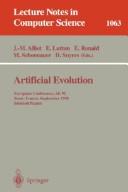
ISBN: 3540611088 3540499482 9783540611080 Year: 1996 Volume: 1063 Publisher: Berlin Springer
Abstract | Keywords | Export | Availability | Bookmark
 Loading...
Loading...Choose an application
- Reference Manager
- EndNote
- RefWorks (Direct export to RefWorks)
This volume presents a collection of revised refereed papers selected from the contributions presented at the European Conference on Artificial Evolution, AE '95, held in Brest, France, in September 1995; also included are a few papers from the predecessor conference, AE '94.Besides two invited surveys on evolution strategies and evolutionary programming, 24 full papers are presented. They are grouped into sections on evolutionary computation theory, genetic algorithm techniques, coevolution, neural networks, image processing, and applications to various optimization and other problems.
Artificial intelligence. Robotics. Simulation. Graphics --- Evolutionary programming (Computer science) --- Genetic algorithms --- Congresses. --- Congresses --- Artificial intelligence. --- Information theory. --- Computer science. --- Computer software. --- Optical pattern recognition. --- Artificial Intelligence. --- Theory of Computation. --- Mathematical Modeling and Industrial Mathematics. --- Computation by Abstract Devices. --- Algorithm Analysis and Problem Complexity. --- Pattern Recognition. --- Communication theory --- Communication --- Cybernetics --- AI (Artificial intelligence) --- Artificial thinking --- Electronic brains --- Intellectronics --- Intelligence, Artificial --- Intelligent machines --- Machine intelligence --- Thinking, Artificial --- Bionics --- Cognitive science --- Digital computer simulation --- Electronic data processing --- Logic machines --- Machine theory --- Self-organizing systems --- Simulation methods --- Fifth generation computers --- Neural computers --- Software, Computer --- Computer systems --- Informatics --- Science --- Optical data processing --- Pattern perception --- Perceptrons --- Visual discrimination --- Evolutionary programming (Computer science) - Congresses. --- Genetic algorithms - Congresses.
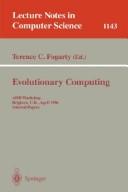
ISBN: 3540604693 0387604693 354047515X 9783540604693 Year: 1995 Volume: 993 Publisher: Berlin Springer
Abstract | Keywords | Export | Availability | Bookmark
 Loading...
Loading...Choose an application
- Reference Manager
- EndNote
- RefWorks (Direct export to RefWorks)
This volume is based on the Workshop on Evolutionary Computing held in Sheffield, U.K., in April 1995 under the sponsorship of the Society for the Study of Artificial Intelligence and Simulation of Behavior (AISB). The 18 full papers presented were selected during a post-workshop refereeing meeting and chosen from 32 submissions for the workshop. The papers are organized in sections on evolutionary computing theory and techniques, timetabling, routing and scheduling, optimization, signal processing and control, and genetic programming. The collection of papers has a certain bias towards real world applications of evolutionary computing and particularly genetic algorithms.
Computer science --- Artificial intelligence. Robotics. Simulation. Graphics --- Evolutionary programming (Computer science) --- Congresses. --- Congresses --- Information theory. --- Artificial intelligence. --- Computer science. --- Computer software. --- Optical pattern recognition. --- Theory of Computation. --- Artificial Intelligence. --- Mathematical Modeling and Industrial Mathematics. --- Computation by Abstract Devices. --- Algorithm Analysis and Problem Complexity. --- Pattern Recognition. --- Optical data processing --- Pattern perception --- Perceptrons --- Visual discrimination --- Software, Computer --- Computer systems --- Informatics --- Science --- AI (Artificial intelligence) --- Artificial thinking --- Electronic brains --- Intellectronics --- Intelligence, Artificial --- Intelligent machines --- Machine intelligence --- Thinking, Artificial --- Bionics --- Cognitive science --- Digital computer simulation --- Electronic data processing --- Logic machines --- Machine theory --- Self-organizing systems --- Simulation methods --- Fifth generation computers --- Neural computers --- Communication theory --- Communication --- Cybernetics --- Evolutionary programming (Computer science) - Congresses.
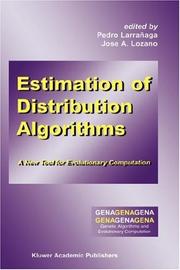
ISBN: 0792374665 1461356040 1461515394 9780792374664 Year: 2002 Volume: 2 Publisher: Boston, Mass. Kluwer
Abstract | Keywords | Export | Availability | Bookmark
 Loading...
Loading...Choose an application
- Reference Manager
- EndNote
- RefWorks (Direct export to RefWorks)
Estimation of Distribution Algorithms: A New Tool for Evolutionary Computation is devoted to a new paradigm for evolutionary computation, named estimation of distribution algorithms (EDAs). This new class of algorithms generalizes genetic algorithms by replacing the crossover and mutation operators with learning and sampling from the probability distribution of the best individuals of the population at each iteration of the algorithm. Working in such a way, the relationships between the variables involved in the problem domain are explicitly and effectively captured and exploited. This text constitutes the first compilation and review of the techniques and applications of this new tool for performing evolutionary computation. Estimation of Distribution Algorithms: A New Tool for Evolutionary Computation is clearly divided into three parts. Part I is dedicated to the foundations of EDAs. In this part, after introducing some probabilistic graphical models - Bayesian and Gaussian networks - a review of existing EDA approaches is presented, as well as some new methods based on more flexible probabilistic graphical models. A mathematical modeling of discrete EDAs is also presented. Part II covers several applications of EDAs in some classical optimization problems: the travelling salesman problem, the job scheduling problem, and the knapsack problem. EDAs are also applied to the optimization of some well-known combinatorial and continuous functions. Part III presents the application of EDAs to solve some problems that arise in the machine learning field: feature subset selection, feature weighting in K-NN classifiers, rule induction, partial abductive inference in Bayesian networks, partitional clustering, and the search for optimal weights in artificial neural networks. Estimation of Distribution Algorithms: A New Tool for Evolutionary Computation is a useful and interesting tool for researchers working in the field of evolutionary computation and for engineers who face real-world optimization problems. This book may also be used by graduate students and researchers in computer science. `... I urge those who are interested in EDAs to study this well-crafted book today.' David E. Goldberg, University of Illinois Champaign-Urbana.
Discrete mathematics --- Evolutionary programming (Computer science) --- Evolutionary computation --- Evolutionary computation. --- Basic Sciences. Mathematics --- Mathematical Models, Simulation Models --- Evolutionary programming (Computer science). --- Mathematical Models, Simulation Models. --- Software engineering. --- Artificial intelligence. --- Programming languages (Electronic computers). --- Software Engineering/Programming and Operating Systems. --- Artificial Intelligence. --- Programming Languages, Compilers, Interpreters. --- Computer languages --- Computer program languages --- Computer programming languages --- Machine language --- Electronic data processing --- Languages, Artificial --- AI (Artificial intelligence) --- Artificial thinking --- Electronic brains --- Intellectronics --- Intelligence, Artificial --- Intelligent machines --- Machine intelligence --- Thinking, Artificial --- Bionics --- Cognitive science --- Digital computer simulation --- Logic machines --- Machine theory --- Self-organizing systems --- Simulation methods --- Fifth generation computers --- Neural computers --- Computer software engineering --- Engineering
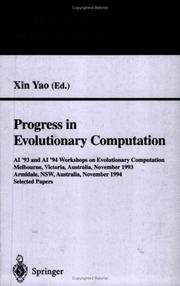
ISBN: 3540601546 3540495282 9783540601548 Year: 1995 Volume: 956 Publisher: Berlin : Springer-Verlag,
Abstract | Keywords | Export | Availability | Bookmark
 Loading...
Loading...Choose an application
- Reference Manager
- EndNote
- RefWorks (Direct export to RefWorks)
This volume contains the best carefully revised full papers selected from the presentations accepted for the AI '93 and AI '94 Workshop on Evolutionary Computation held in Australia. The 21 papers included cover a wide range of topics in the field of evolutionary computation, from constrained function optimization to combinatorial optimization, from evolutionary programming to genetic programming, from robotic strategy learning to co-evolutionary game strategy learning. The papers reflect important recent progress in the field; more than half of the papers come from overseas.
Evolutionary programming (Computer science) --- Genetic algorithms --- Artificial intelligence --- Congresses. --- Congresses --- Artificial intelligence. --- Numerical analysis. --- Distribution (Probability theory. --- Statistics. --- Operations research. --- Combinatorics. --- Artificial Intelligence. --- Numerical Analysis. --- Probability Theory and Stochastic Processes. --- Statistics, general. --- Operations Research/Decision Theory. --- Combinatorics --- Algebra --- Mathematical analysis --- Operational analysis --- Operational research --- Industrial engineering --- Management science --- Research --- System theory --- Statistical analysis --- Statistical data --- Statistical methods --- Statistical science --- Mathematics --- Econometrics --- Distribution functions --- Frequency distribution --- Characteristic functions --- Probabilities --- AI (Artificial intelligence) --- Artificial thinking --- Electronic brains --- Intellectronics --- Intelligence, Artificial --- Intelligent machines --- Machine intelligence --- Thinking, Artificial --- Bionics --- Cognitive science --- Digital computer simulation --- Electronic data processing --- Logic machines --- Machine theory --- Self-organizing systems --- Simulation methods --- Fifth generation computers --- Neural computers --- Evolutionary programming (Computer science) - Congresses. --- Genetic algorithms - Congresses. --- Artificial intelligence - Congresses.
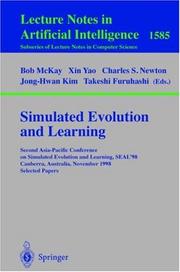
ISBN: 3540659072 9783540659075 3540488731 Year: 1999 Volume: 1585 Publisher: Berlin ; Heidelberg : Springer,
Abstract | Keywords | Export | Availability | Bookmark
 Loading...
Loading...Choose an application
- Reference Manager
- EndNote
- RefWorks (Direct export to RefWorks)
This volume contains selected papers presented at the Second Asia-Paci c C- ference on Simulated Evolution and Learning (SEAL’98), from 24 to 27 Nov- ber 1998, in Canberra, Australia. SEAL’98 received a total of 92 submissions (67 papers for the regular sessions and 25 for the applications sessions). All papers were reviewed by three independent reviewers. After review, 62 papers were - cepted for oral presentation and 13 for poster presentation. Some of the accepted papers were selected for inclusion in this volume. SEAL’98 also featured a fully refereed special session on Evolutionary Computation in Power Engineering - ganised by Professor Kit Po Wong and Dr Loi Lei Lai. Two of the ve accepted papers are included in this volume. The papers included in these proceedings cover a wide range of topics in simulated evolution and learning, from self-adaptation to dynamic modelling, from reinforcement learning to agent systems, from evolutionary games to e- lutionary economics, and from novel theoretical results to successful applications, among others. SEAL’98 attracted 94 participants from 14 di erent countries, namely A- tralia, Belgium, Brazil, Germany, Iceland, India, Japan, South Korea, New Z- land, Portugal, Sweden, Taiwan, UK and the USA. It had three distinguished international scientists as keynote speakers, giving talks on natural computation (Hans-Paul Schwefel), reinforcement learning (Richard Sutton), and novel m- els in evolutionary design (John Gero). More information about SEAL’98 is still available at http://www.cs.adfa.edu.au/conference/seal98/.
Computer simulation --- Evolutionary programming (Computer science) --- Artificial intelligence --- Computer Science --- Engineering & Applied Sciences --- Computer science. --- Computers. --- Artificial intelligence. --- Computer simulation. --- Computer Science. --- Artificial Intelligence (incl. Robotics). --- Simulation and Modeling. --- Computation by Abstract Devices. --- Artificial Intelligence. --- Informatics --- Science --- Computer modeling --- Computer models --- Modeling, Computer --- Models, Computer --- Simulation, Computer --- Electromechanical analogies --- Mathematical models --- Simulation methods --- Model-integrated computing --- AI (Artificial intelligence) --- Artificial thinking --- Electronic brains --- Intellectronics --- Intelligence, Artificial --- Intelligent machines --- Machine intelligence --- Thinking, Artificial --- Bionics --- Cognitive science --- Digital computer simulation --- Electronic data processing --- Logic machines --- Machine theory --- Self-organizing systems --- Fifth generation computers --- Neural computers --- Automatic computers --- Automatic data processors --- Computer hardware --- Computing machines (Computers) --- Electronic calculating-machines --- Electronic computers --- Hardware, Computer --- Computer systems --- Cybernetics --- Calculators --- Cyberspace --- Computer simulation - Congresses --- Evolutionary programming (Computer science) - Congresses --- Artificial intelligence - Congresses
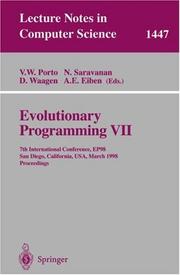
ISSN: 03029743 ISBN: 3540648917 3540685154 9783540648918 Year: 1998 Volume: 1447 Publisher: Berlin, Heidelberg : Springer Berlin Heidelberg : Imprint: Springer,
Abstract | Keywords | Export | Availability | Bookmark
 Loading...
Loading...Choose an application
- Reference Manager
- EndNote
- RefWorks (Direct export to RefWorks)
This book constitutes the thoroughly refereed post-conference proceedings of the 7th International Conference on Evolutionary Programming, EP98, held in San Diego, CA, USA, in March 1998. The volume presents 81 revised full papers selected from an overwhelming number of submissions. The papers are organized in topical sections on economics, emergence and complex systems; issues and innovations in evolutionary computation; applications; evolution-based approaches to engineering design; examining representations and operators; evolutionary computation theory; evolutionary computation and biological modeling; particle swarm; and combinations of evolutionary and neural computation.
Evolutionary programming (Computer science) --- Congresses --- Computer science. --- Microprocessors. --- Computer programming. --- Computers. --- Algorithms. --- Artificial intelligence. --- Computer Science. --- Computation by Abstract Devices. --- Algorithm Analysis and Problem Complexity. --- Programming Techniques. --- Processor Architectures. --- Artificial Intelligence (incl. Robotics). --- Computer software. --- Artificial Intelligence. --- Informatics --- Science --- Software, Computer --- Computer systems --- AI (Artificial intelligence) --- Artificial thinking --- Electronic brains --- Intellectronics --- Intelligence, Artificial --- Intelligent machines --- Machine intelligence --- Thinking, Artificial --- Bionics --- Cognitive science --- Digital computer simulation --- Electronic data processing --- Logic machines --- Machine theory --- Self-organizing systems --- Simulation methods --- Fifth generation computers --- Neural computers --- Minicomputers --- Computers --- Electronic computer programming --- Electronic digital computers --- Programming (Electronic computers) --- Coding theory --- Algorism --- Algebra --- Arithmetic --- Automatic computers --- Automatic data processors --- Computer hardware --- Computing machines (Computers) --- Electronic calculating-machines --- Electronic computers --- Hardware, Computer --- Cybernetics --- Calculators --- Cyberspace --- Programming --- Foundations --- Evolutionary programming (Computer science) - Congresses
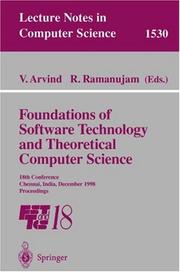
ISSN: 03029743 ISBN: 3540653848 9783540653844 3540493824 Year: 1998 Volume: 1530 Publisher: Berlin, Germany : Springer,
Abstract | Keywords | Export | Availability | Bookmark
 Loading...
Loading...Choose an application
- Reference Manager
- EndNote
- RefWorks (Direct export to RefWorks)
Evolutionary programming (Computer science) --- Quantum computers --- Molecular computers --- Programmation évolutive --- Ordinateurs quantiques --- Ordinateurs moléculaires --- Congresses --- Programming Languages, Compilers, Interpreters. --- Computer software --- Electronic data processing --- Computer science. --- Software engineering. --- Programming languages (Electronic computers). --- Computers. --- Computer science --- Computer Science. --- Theory of Computation. --- Software Engineering. --- Discrete Mathematics in Computer Science. --- Mathematics. --- Information theory. --- Computational complexity. --- Complexity, Computational --- Machine theory --- Informatics --- Science --- Computer software engineering --- Engineering --- Communication theory --- Communication --- Cybernetics --- Computer science—Mathematics. --- Computer languages --- Computer program languages --- Computer programming languages --- Machine language --- Languages, Artificial --- Automatic computers --- Automatic data processors --- Computer hardware --- Computing machines (Computers) --- Electronic brains --- Electronic calculating-machines --- Electronic computers --- Hardware, Computer --- Computer systems --- Calculators --- Cyberspace --- Molecular computers. --- Computer software. --- Software, Computer --- DNA-based computers --- DNA computers --- Biocomputers --- Natural computation --- Evolutionary programming (Computer science) - Congresses --- Quantum computers - Congresses --- Molecular computers - Congresses --- Programmation évolutive - Congrès --- Ordinateurs quantiques - Congrès --- Ordinateurs moléculaires - Congrès
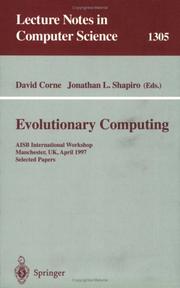
ISBN: 3540634762 3540695788 9783540634768 Year: 1997 Volume: 1305 Publisher: Berlin Springer
Abstract | Keywords | Export | Availability | Bookmark
 Loading...
Loading...Choose an application
- Reference Manager
- EndNote
- RefWorks (Direct export to RefWorks)
This book constitutes the refereed post-workshop proceedings of the AISB International Workshop on Evolutionary Computing, held in Manchester, UK, in April 1997. The 22 strictly reviewed and revised full papers presented were selected for inclusion in the book after two rounds of refereeing. The papers are organized in sections on evolutionary approaches to issues in biology and economics, problem structure and finite landscapes, evolutionary machine learning and classifier systems, evolutionary scheduling, and more techniques and applications of evolutionary algorithms.
Computer science --- Artificial intelligence. Robotics. Simulation. Graphics --- Evolutionary programming (Computer science) --- Evolutionary computation --- Congresses. --- Computer Science --- Engineering & Applied Sciences --- Congresses --- Computer science. --- Information technology. --- Business --- Computers. --- Algorithms. --- Artificial intelligence. --- Bioinformatics. --- Computational biology. --- Computer Science. --- Artificial Intelligence (incl. Robotics). --- Theory of Computation. --- Algorithm Analysis and Problem Complexity. --- Computation by Abstract Devices. --- IT in Business. --- Computer Appl. in Life Sciences. --- Data processing. --- Information theory. --- Computer software. --- Biology --- Artificial Intelligence. --- Communication theory --- Communication --- Cybernetics --- Software, Computer --- Computer systems --- IT (Information technology) --- Technology --- Telematics --- Information superhighway --- Knowledge management --- Informatics --- Science --- AI (Artificial intelligence) --- Artificial thinking --- Electronic brains --- Intellectronics --- Intelligence, Artificial --- Intelligent machines --- Machine intelligence --- Thinking, Artificial --- Bionics --- Cognitive science --- Digital computer simulation --- Electronic data processing --- Logic machines --- Machine theory --- Self-organizing systems --- Simulation methods --- Fifth generation computers --- Neural computers --- Business—Data processing. --- Bioinformatics . --- Computational biology . --- Bioinformatics --- Bio-informatics --- Biological informatics --- Information science --- Computational biology --- Systems biology --- Algorism --- Algebra --- Arithmetic --- Automatic computers --- Automatic data processors --- Computer hardware --- Computing machines (Computers) --- Electronic calculating-machines --- Electronic computers --- Hardware, Computer --- Calculators --- Cyberspace --- Data processing --- Foundations --- Evolutionary programming (Computer science) - Congresses. --- Evolutionary computation - Congresses.
| Listing 1 - 10 of 16 | << page >> |
Sort by
|

 Search
Search Feedback
Feedback About UniCat
About UniCat  Help
Help News
News